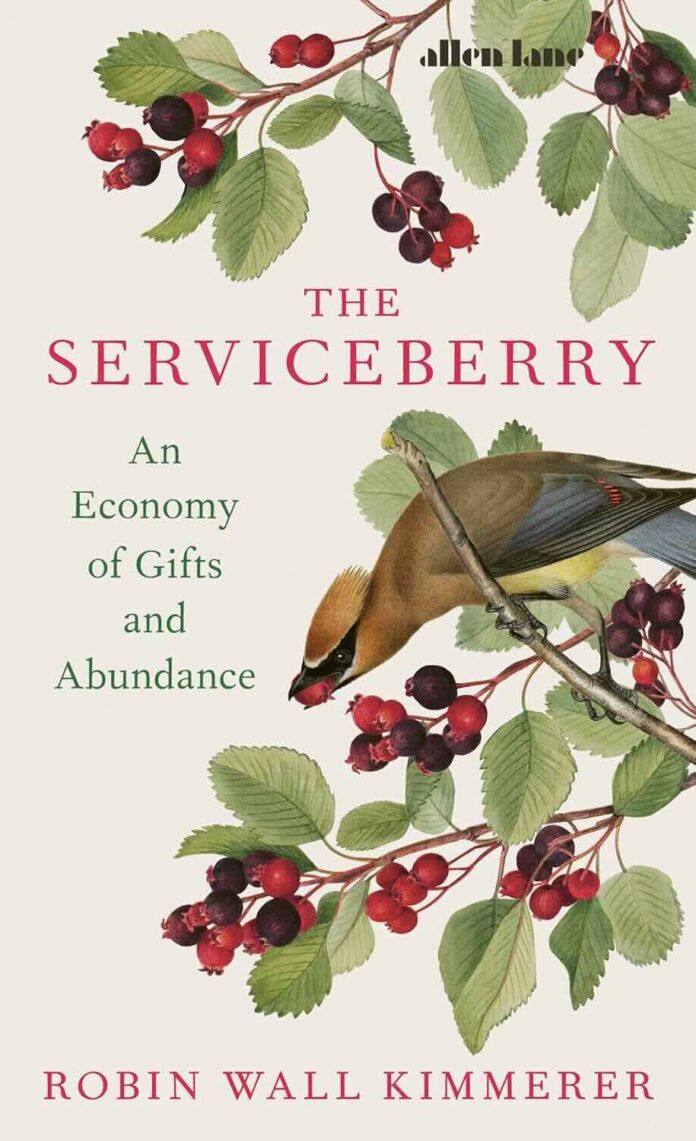In her latest work, The Serviceberry, Robin Wall Kimmerer weaves together ecology, economics, and Indigenous wisdom to present a compelling vision for reimagining our relationship with the natural world and each other. Building on the profound insights of her bestseller Braiding Sweetgrass, Kimmerer uses the humble serviceberry as a lens to examine how we might transition from an economy of scarcity to one of abundance and reciprocity.
The Heart of the Matter: Gift Economies in Nature
Kimmerer’s narrative begins with a simple yet profound moment—picking serviceberries alongside birds on a summer evening. Through this shared harvest, she illustrates how nature operates on principles of gift-giving rather than scarcity and competition. The serviceberry tree freely offers its fruits to birds, insects, and humans alike, creating a web of mutual relationships that ensures the survival and flourishing of all species involved.
This observation serves as a springboard for examining deeper questions about economic systems and human values. Kimmerer argues that our current market economy, based on artificial scarcity and relentless growth, is fundamentally misaligned with both ecological principles and human well-being.
Indigenous Wisdom Meets Modern Economics
Drawing from her Potawatomi heritage and scientific training, Kimmerer presents Indigenous concepts like the “Honorable Harvest”—guidelines for taking from nature with respect and reciprocity. These ancient principles offer practical wisdom for creating more sustainable economic relationships:
- Know the ways of the ones who take care of you
- Ask permission and abide by the answer
- Never take more than half
- Use resources respectfully and share abundance
- Give gifts in reciprocity
What makes Kimmerer’s analysis particularly compelling is how she connects these traditional teachings to contemporary economic challenges and opportunities. She explores how gift economies already exist alongside market economies in our daily lives—from neighborhood farm stands to public libraries to digital knowledge sharing.
Strengths and Notable Insights
The book’s greatest strength lies in Kimmerer’s ability to make complex economic and ecological concepts accessible through storytelling and careful observation. Her prose is both lyrical and precise, helping readers see familiar landscapes and interactions through new eyes.
Particularly noteworthy are her discussions of:
- How manufactured scarcity drives environmental destruction
- The role of gratitude in reshaping economic relationships
- Examples of functioning gift economies in modern contexts
- The parallel between ecological succession and economic transformation
Areas for Development
While the book offers profound insights, some readers may find certain aspects challenging:
- The economic analysis, while thoughtful, sometimes simplifies complex market dynamics
- More concrete examples of large-scale gift economy implementation would strengthen the argument
- The transition pathways from current systems could be more fully developed
Literary Craftsmanship
Kimmerer’s writing style seamlessly blends scientific precision with poetic sensibility. Her use of the serviceberry as both literal subject and metaphorical framework demonstrates masterful control of narrative structure. The book’s relatively short length (compared to Braiding Sweetgrass) makes it a concentrated dose of wisdom that rewards careful reading and reflection.
Contextual Significance
This work arrives at a crucial moment when many are questioning fundamental assumptions about economics, environment, and society. It joins other important works in this space, such as Kate Raworth’s Doughnut Economics and Charles Eisenstein’s Sacred Economics, while offering a unique perspective grounded in both Indigenous knowledge and ecological science.
Impact and Audience
The Serviceberry will resonate with diverse readers:
- Environmentalists seeking alternative economic models
- Business leaders interested in sustainability
- Students of Indigenous wisdom and practices
- Anyone concerned about climate change and social justice
- Readers interested in the intersection of nature and human systems
Comparative Context
While this book builds on themes from Braiding Sweetgrass, it offers a more focused examination of economic relationships. Readers familiar with Kimmerer’s previous work will find new insights here, while newcomers will discover an accessible entry point to her ideas.
Critical Assessment
The book succeeds brilliantly in its core mission of helping readers reimagine economic relationships through ecological wisdom. Its main limitation is not in what it includes but in what it leaves unexplored—the practical challenges of scaling gift economies in a complex global society.
Conclusion: A Timely Vision
The Serviceberry offers more than critique – it presents a vision of hope grounded in the wisdom of both traditional knowledge and natural systems. While not a complete blueprint for economic transformation, it provides essential principles and perspectives for reimagining our relationship with wealth, community, and the natural world.
As climate change and social inequality intensify, Kimmerer’s insights about reciprocity and gratitude become increasingly relevant. This book reminds us that alternatives to our current system exist not only in theory but in the living world around us. It’s a powerful invitation to reconsider what truly constitutes wealth and how we might create economies that nurture rather than destroy what we love.
In an era of mounting environmental and social crises, The Serviceberry offers wisdom we urgently need. It deserves a place alongside other seminal works challenging us to reimagine our economic relationships with each other and the living world.





